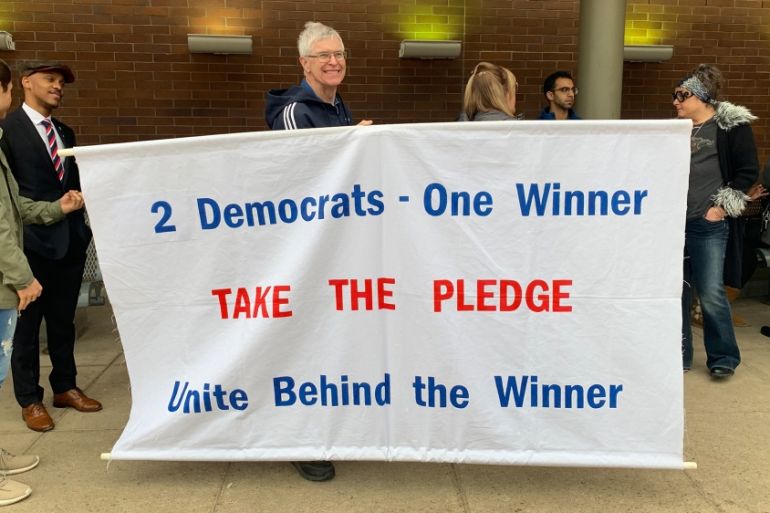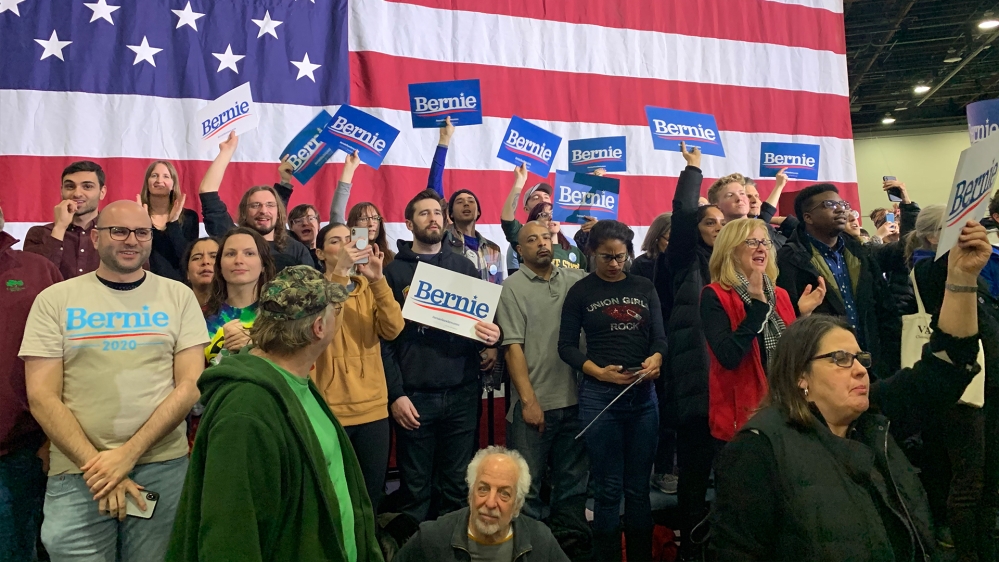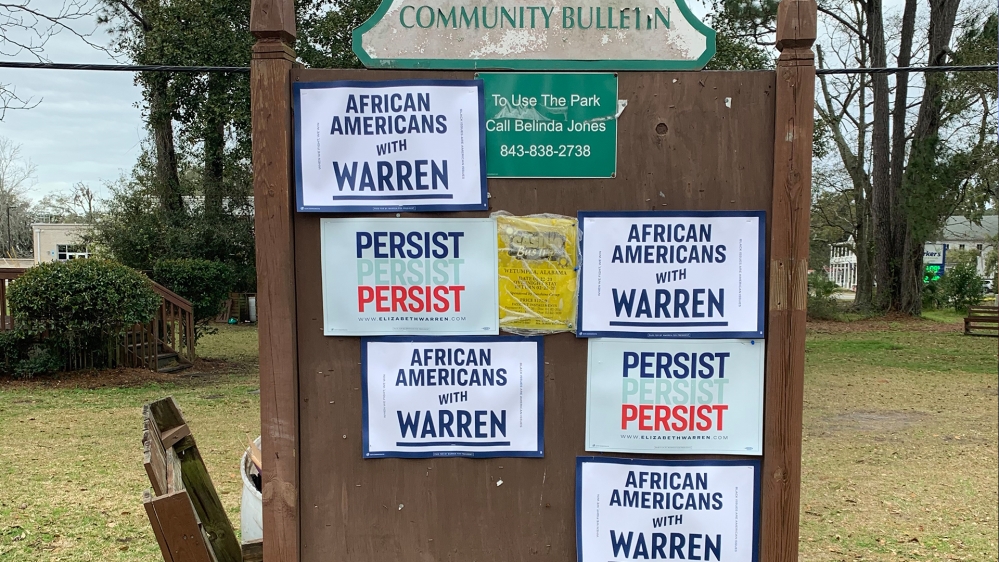Against party lines: Democrats divided before US elections
Can progressives and moderates in the US Democratic Party find common ground in order to take back the White House?

On March 9, US presidential hopeful Joe Biden held a large rally at Renaissance High School in northwest Detroit. It was the eve of the Michigan primary, and Democratic Party Senators Cory Booker and Kamala Harris were in town to give the former vice president a boost.
While Biden was delivering his stump speech, multiple protests broke out in the crowd.
Keep reading
list of 4 items‘Insurrection’ should bar Donald Trump from US presidency, lawyers argue
Ex-Proud Boys leader Joseph Biggs sentenced to 17 years for US Capitol riot
Trump indictments: Key court dates set in Georgia, federal election cases
One man unfurled a banner that said “NAFTA killed our jobs”, in reference to the North American Free Trade Agreement backed by Biden, while other protesters chanted “Hey, hey, ho, ho, Joe Biden has got to go!”
“The Bernie Bros are here,” Biden murmured softly, alluding to the young, vocal fans of his then-rival, Senator Bernie Sanders.
The interruption underscored a larger dynamic playing out within the Democratic Party, which is being pulled in different directions by loyalists with very different visions for the party’s future.

While making our Fault Lines film, America’s Divided Democrats, we spent weeks on the campaign trail with activists and volunteers in the two places that may have mattered the most – South Carolina and Michigan.
The overall feeling among Democrats we spoke to was that the party is deeply divided and might be too splintered to unify behind Biden in November.
“He’s a guy who promises a return to normalcy and a lack of, you know, sweeping change. And I don’t think that message resonates with a lot of young people right now,” explained Naina Agrawal-Hardin, an activist with Sunrise Movement in Michigan.
“I hope that people will be energised enough by the desire to beat Donald Trump that they show up to vote anyway, but it is a concern.”

The party has largely bifurcated into two camps.
The progressive wing of the party has been led by Sanders and Senator Elizabeth Warren. They pushed for a Green New Deal to combat climate change, universal healthcare, and free college tuition.
The moderate wing of the party eventually coalesced around Biden after his blowout win in South Carolina, largely propelled by Black voters. This lane sees electability as the main selling point and thinks a centrist like Biden is the right candidate to defeat President Trump.
“I know he has a lot of support from independents. He obviously has a lot of support from Democrats,” said Margie Kanner, a Detroit-based attorney and longtime Biden supporter.
“I think that is the recipe, I don’t think any candidate is going to win the presidency with just the party base.”
Many progressives disagree with this sentiment and feel like the party is making the same mistake it has made in the past by putting forth centrist candidates to try to win over Republicans or independents.

“A lot of moderates think you need milquetoast or weak sauce in order to attract people who are swing voters. The truth is swing voters don’t like Democrats or Republicans. They feel like the whole system is corrupt,” said Adam Green, a Warren supporter and progressive activist.
“If you have someone like Joe Biden as the nominee whose core brand is cutting corrupt backroom deals with politicians like Mitch McConnell or corrupt corporations, that is possibly our worst foot forward against Donald Trump.”
Another major point of contention is how money influences party politics. Sanders developed a vastly different mechanism for raising funds, relying on millions of small donations as opposed to large cheques from wealthy donors. His supporters claim that relying on corporate money makes the party beholden to corporate interests.
“I think the cleavage in American politics today is money,” said Faiz Shakir, the campaign manager for Sanders. “Moderates in modern-day parlance literally means reliant on corporate money, that’s what it has become, [that] I will settle for some middle ground that corporate friends will like. That’s what a moderate is.”
“I kind of dispute the notion that these people are moderates, they are truly corporately funded,” he added.

Biden was fortunate that other moderate candidates dropped out of the race after South Carolina and before Super Tuesday. He was able to win over African Americans and suburban women – two crucial voting blocs within the party.
“I think that he is someone that people know and I think that’s why you saw the turnout on Super Tuesday, even without a large ground game in some of those states,” said Lonnie Scott, the executive director of Progress Michigan.
“I think that he is like comfort food for some people. He is the devil that you know, he was there with Barack Obama and has been doing work as a public servant for a really long time.”
Biden’s victory puts progressives in a difficult spot with few options. Primary voters have shut the door on any major structural changes. Biden still has not selected his nominee for vice president, but if he chooses a progressive running mate it could heal some of the divisions within the party.
“I think it would be a wise choice, strategically,” said Agrawal-Hardin. “I think it would show progressives that we are wanted in this party, but whether the party will do that, I don’t know, but I hope so.”
